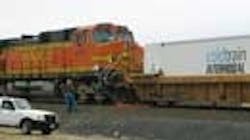Cold Train Intermodal marks one-year anniversary
The Pacific Northwest-Chicagoland Express Cold Train Intermodal Service is celebrating a successful one-year anniversary. This service was launched in April 2010 in partnership with the Port of Quincy (WA) Intermodal Terminal.
In December 2010, Cold Train was spun off from Rail Logistics of Overland Park KS. According to Chris Mnichowski, owner and president of CTI Freight Systems, the parent company of Cold Train Intermodal, “We needed to direct our time, talents, and resources to further build the Cold Train network and on acquiring additional assets to service growing customer demand.”
Since the Cold Train refrigerated intermodal container rail and distribution service (between Quincy WA and Chicago IL) started a year ago, it has rapidly grown in popularity with produce shippers in the Pacific Northwest as well as shippers in the Midwest. Five days a week, the Cold Train service departs the Port of Quincy in central Washington loaded with fresh or frozen produce destined for the Midwest. The produce, grown and packed by local growers/packers in Washington state, is loaded into the Cold Train’s 53-foot refrigerated containers and brought to the Port of Quincy Intermodal Terminal. At the terminal, the containers are double-stacked onto an expedited nonstop train to Chicago. On arrival in Chicago, each container is carefully placed on a truck chassis for transport to its final destination.
The Cold Train’s trip takes less than four days, much faster than typical rail refrigerated boxcar service, which requires more handling of the product and where delivery can take up to two weeks. The speed of Cold Train’s intermodal service places it on par with trucks. Additionally, the Cold Train reduces carbon footprint by as much as 50% compared with standard trucks, as it takes less diesel fuel to power a train. Furthermore, advanced technology allows the reefer units on the Cold Train to be tracked and remotely controlled.
For more information about the Cold Train, contact Steve Lawson at 913-491-0050 or [email protected].
